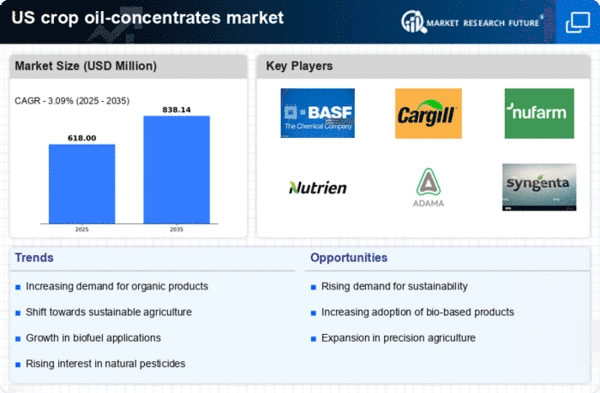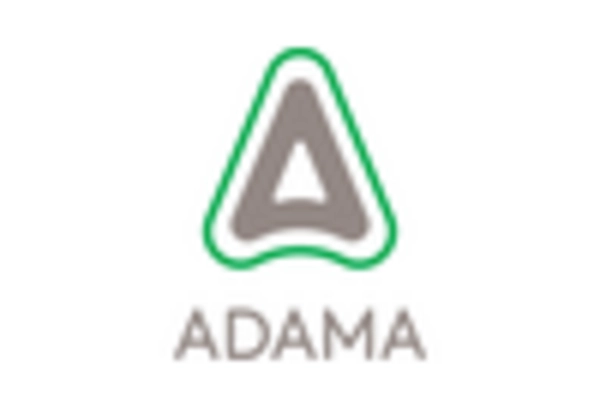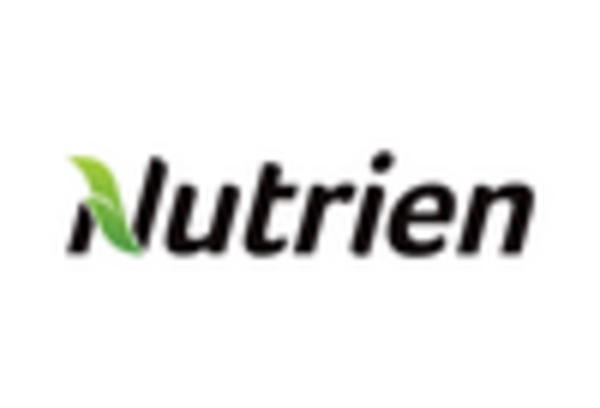Shifts in Dietary Preferences
The changing dietary preferences among consumers are significantly influencing the crop oil-concentrates market. With the rise of plant-based diets and the reduction of animal fats in food products, there is an increasing reliance on crop oil-concentrates as a primary source of fats and oils. This trend is particularly evident in the food service industry, where restaurants and food manufacturers are reformulating their products to align with consumer preferences. As a result, the crop oil-concentrates market is expected to experience a growth rate of around 10% over the next few years. This shift not only reflects changing consumer habits but also presents opportunities for innovation in product development.
Expansion of Biofuel Production
The push for renewable energy sources is significantly impacting the crop oil-concentrates market. With the U.S. government promoting biofuels as a sustainable alternative to fossil fuels, there is a growing demand for crop oil-concentrates as feedstock for biodiesel production. In 2025, biofuels are expected to account for nearly 10% of the total energy consumption in the U.S., with crop oil-concentrates playing a crucial role in this transition. This trend not only supports environmental goals but also stimulates economic growth within the agricultural sector. As biofuel production expands, the crop oil-concentrates market is likely to benefit from increased investments and innovations aimed at enhancing production efficiency and sustainability.
Rising Demand for Organic Products
The increasing consumer preference for organic and natural products is driving growth in the crop oil-concentrates market. As consumers become more health-conscious, they are seeking products that are free from synthetic additives and chemicals. This trend is reflected in the market, where organic crop oil-concentrates are gaining traction. According to recent data, the organic segment of the crop oil-concentrates market is projected to grow at a CAGR of approximately 8% over the next five years. This shift towards organic products is not only influencing consumer choices but also prompting manufacturers to adapt their offerings to meet this demand. Consequently, the crop oil-concentrates market is likely to see an increase in the availability of organic options, which could further enhance market growth.
Increased Awareness of Health Benefits
Growing awareness of the health benefits associated with various crop oil-concentrates is driving market growth. Consumers are becoming more informed about the nutritional advantages of oils derived from crops such as canola, sunflower, and olive. These oils are recognized for their heart-healthy properties and are increasingly being incorporated into diets. As health trends continue to evolve, the crop oil-concentrates market is likely to see a surge in demand for oils that promote wellness. Market Research Future indicates that the health-conscious segment is expected to grow by approximately 12% in the coming years, further solidifying the role of crop oil-concentrates in the food industry.
Technological Innovations in Extraction Processes
Advancements in extraction technologies are transforming the crop oil-concentrates market. Innovative methods such as cold pressing and supercritical fluid extraction are enhancing the efficiency and yield of oil extraction from crops. These technologies not only improve the quality of the final product but also reduce waste and energy consumption. As a result, manufacturers are increasingly adopting these methods to remain competitive. The implementation of such technologies is expected to lead to a reduction in production costs by approximately 15% over the next few years. This shift towards more efficient extraction processes is likely to bolster the crop oil-concentrates market, making it more attractive to both producers and consumers.
















